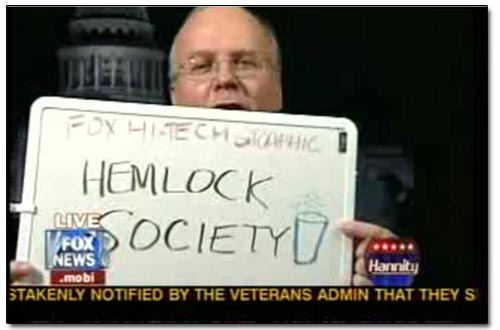The Wall Street Journal, once a respected financial news publisher before Rupert Murdoch got his hands on it, is now the home of rabidly partisan propagandists who seek only to advance self-serving political agendas. One of those is former Bush flack, Karl Rove.
 In an op-ed today, Rove addressed the intricacies of modern campaigning and passed along some of the lessons he has learned from a lifetime of electioneering. But in his haste to demean President Obama as a profligate spender obsessed with winning reelection, Rove ended up making a convincing case for campaign finance reform, including eliminating SuperPACS like his own Crossroads GPS.
In an op-ed today, Rove addressed the intricacies of modern campaigning and passed along some of the lessons he has learned from a lifetime of electioneering. But in his haste to demean President Obama as a profligate spender obsessed with winning reelection, Rove ended up making a convincing case for campaign finance reform, including eliminating SuperPACS like his own Crossroads GPS.
The op-ed opened with Rove regurgitating a few well-known, and widely debunked, out-of-context misrepresentations of the President’s remarks. In rapid succession he rattled off what he called Obama’s “problematic statements:”
- “You didn’t build that.” Where Obama was actually referring to roads and bridges, not private businesses.
- “The private sector is doing fine.” Where Obama was correctly making a relative comparison of the private sector to the public sector.
- “We tried our plan and it worked” Where Obama was referencing the success of the Clinton era policies as opposed to the failure of the GOP’s years under Bush’s policies.
The GOP is laying the entire foundation of their campaign on these deliberate lies, and it is not surprising to see Rove commence his editorial by highlighting them. What’s surprising is what comes next. Rove squeezes out some faux sympathy for the President’s exhaustive workload. He goes into some detail enumerating the stressful itinerary of a candidate for the White House.
Rove: Many people don’t fully appreciate how much of a drain it is on a candidate—involving travel, a speech or two, private meetings with particularly energetic (or obnoxious) money bundlers, and always plenty of advice. Most fundraisers also include a long photo line where the candidate grips and grins for dozens, sometimes hundreds, of photographs.
I observed first-hand how difficult it was to wedge 86 fundraisers onto President George W. Bush’s calendar over the 14.5 months from May 16, 2003 (when he filed for re-election) through July 2004.
Indeed. Raising money for a viable presidential campaign is a back-breaking endeavor that diverts the candidate’s attention from other pressing matters, whether they be communicating with voters, developing policies and campaign platforms, or fulfilling any other duties outside of the campaign, like running a country.
Unfortunately, fundraising is a fact of campaign life. No one, including Rove, would suggest that a candidate could neglect this duty and still have a chance of winning. This is more true than ever in the post-Citizens United era where corporations and wealthy individuals have been freed to make unlimited (and sometimes undisclosed) contributions to candidates. The new electioneering environment forces candidates to spend more time and effort on soliciting donations than ever before. These observations are powerful evidence for why reform is such an imperative. Corporate cash and secret bankrolls have no place in democratic elections and they only make the practice of fair elections more difficult. Thanks for pointing that out, Karl.
Ironically, Rove is a prominent advocate of Citizens United. He is also a major beneficiary of it via his network of political action committees. Rove has boasted that he intends to raise and spend hundreds of millions of dollars this election cycle. So, in effect, Rove is cashing in on a practice that he admits is detrimental and places undue burdens on office-seekers. He further admits that, despite Obama’s best efforts, he is still trailing Romney and the GOP, largely because of Rove’s own prowess at hauling in boat loads of bucks from billionaires with aspirations to buy election outcomes.
If we were to take Rove’s initial points seriously, the country would rise up against Citizens United and the flash flood of cash that it unleashed on the electoral process. Without meaning to, Rove has made an excellent case for overturning CU and restoring the democratic principle of one-man-one-vote, rather than one-dollar-one-vote. But Rove doesn’t take his own arguments seriously because he is too heavily invested in the windfall he receives both personally and for the benefit of his GOP pals. As usual, he is demonstrating the brazen hypocrisy that is typical of his species of parasite.

